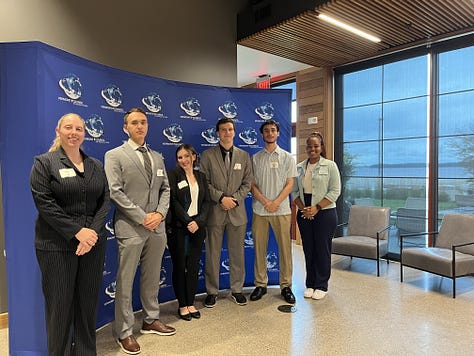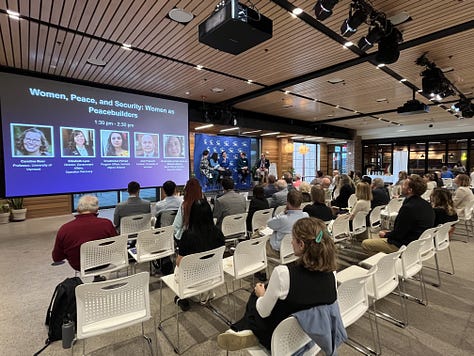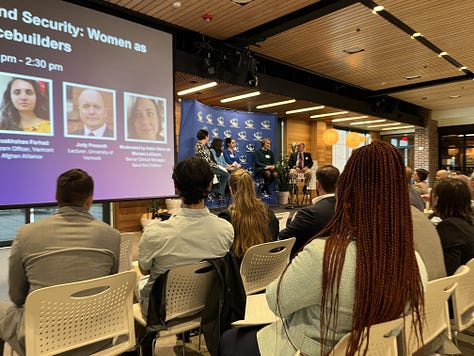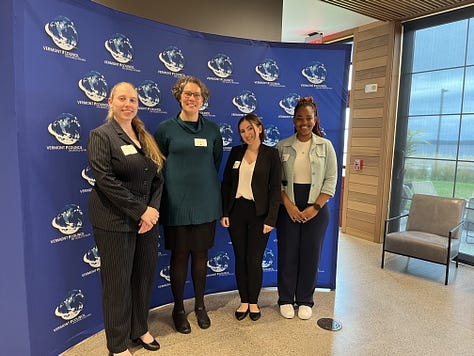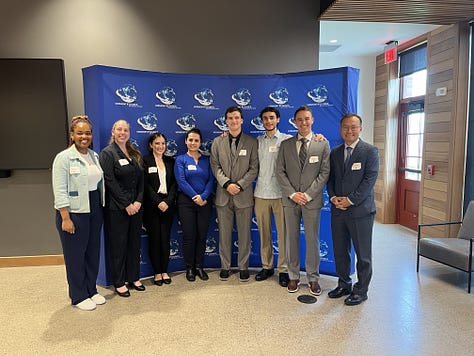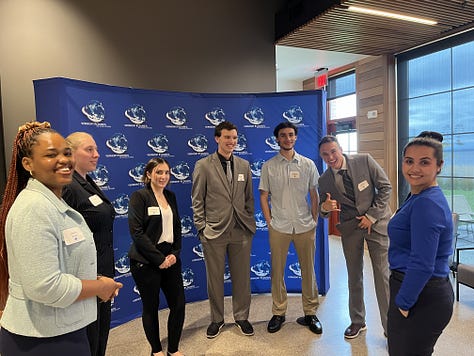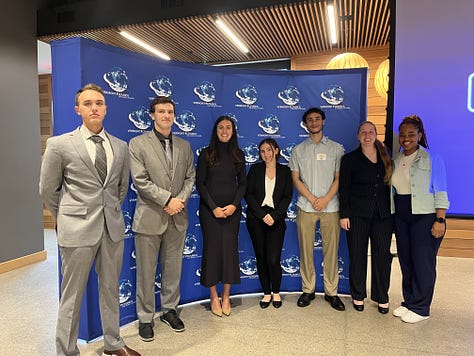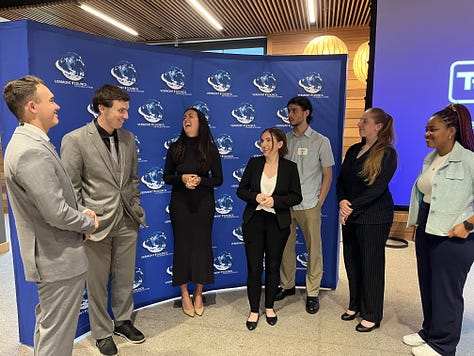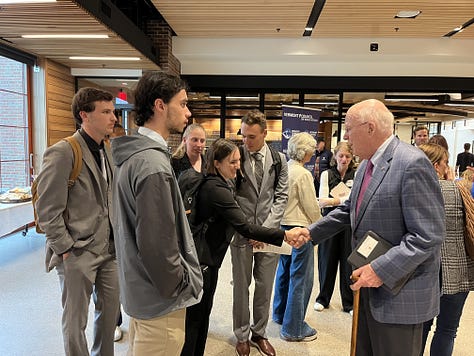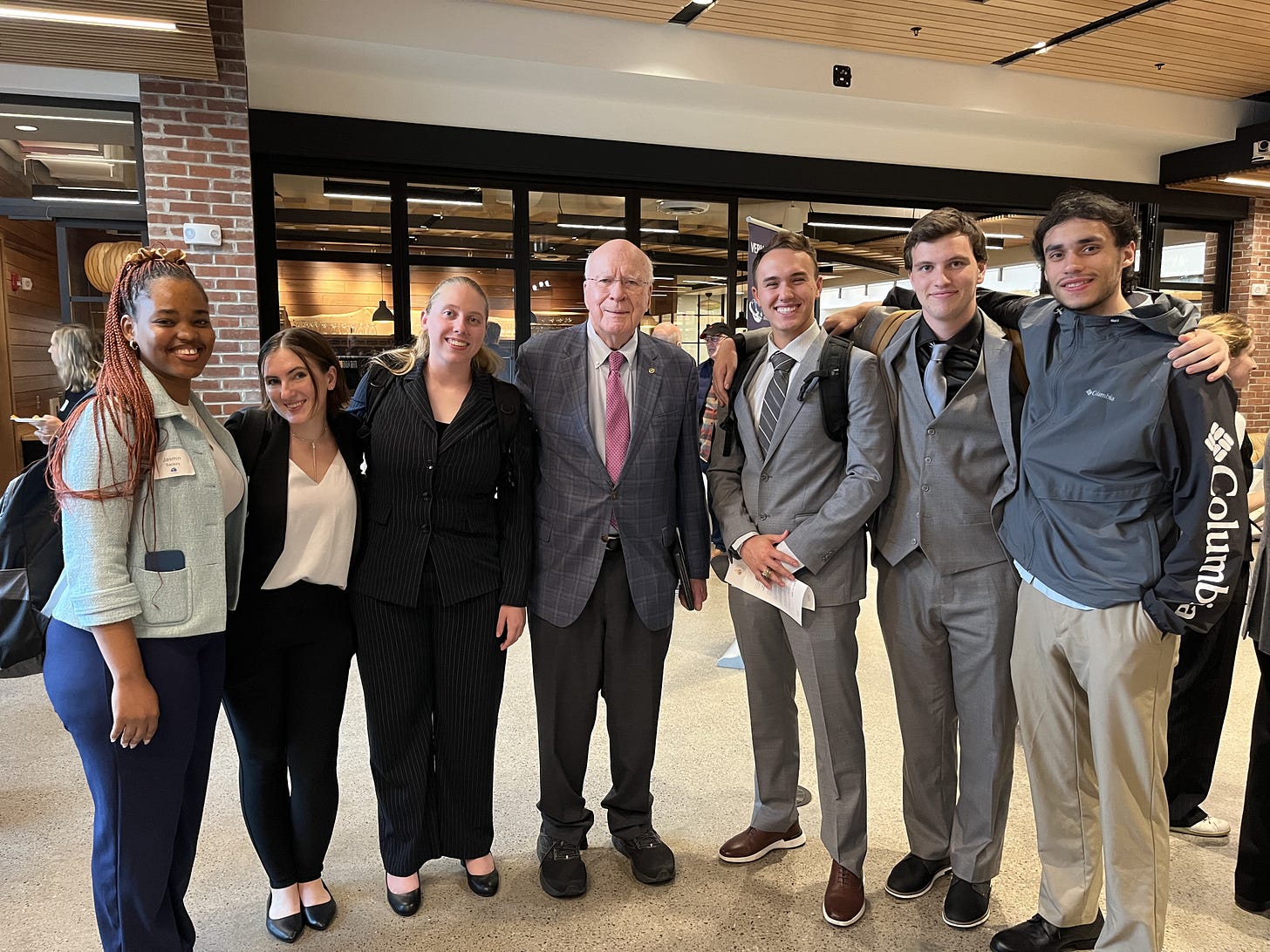On September 25, 2024, Associate Director Dr. Yangmo Ku and six Norwich University students celebrated the International Day of Peace by attending the Vermont Council on World Affairs’ 2024 Peace Celebration. Below are their reflections on their experience.
Established in 1981 by unanimous United Nations resolution, the International Day of Peace represents a globally shared day for all humanity to commit to building a culture of peace in communities around the world. The Vermont Council on World Affairs once again celebrated the International Day of Peace with programming focused on this important topic.
This year's event, Peace in Progress: Understanding Today, Shaping Tomorrow, focused on the future of peace and explored current global peace landscape and envisioned future pathways to a more unified world. The goal of this event, was to unite advocates, visionaries, and policymakers who are committed to building a more peaceful and secure world.
Dr. Yangmo Ku, Associate Director, Peace & War Center
The 2024 Peace Celebration was an eye-opening event in which speakers closely addressed the important roles of women (especially, mothers) in the anti-violence and anti-corruption campaigns in Latin American Countries. It was also highly inspiring to see both Israeli and Palestinian civil activists work together to end the conflicts in the Middle East and to bring peace and reconciliation to the region despite turbulent geopolitical conditions.
Hailey Forar (CSIA Junior)
I am a Computer Security and Information Assurance major, so I do not have much of a background rooted within diplomacy or the inner workings of political science and peacemakers, however this event put on by the Vermont Council of World Affairs was a phenomenal experience. My top takeaway from this celebration of peace was the incredibly important idea that we as individuals cannot wait for the government to solve our problems. It is the job of all of us to promote and work towards the ideal goal of peace to create the tomorrow we want, based on the today we know. We need to remember that we are all human, we make mistakes, and we fail, but that is okay. It is okay as long as we learn from those mistakes, and gain valuable knowledge from our failures in order to progressively move forward. As a society we need to have more of a focus on creating subnational, national, and international relations to create pathways for diplomacy and peacebuilding that can span the globe. To reiterate, it is not simply a job for one person; it is the job of everyone which means we need those same pathways to open up to the equity and opportunity for everyone, no matter race, gender, color, or creed. No matter how small your goals start out for a better future, everything must start somewhere, why not with you? Put your message for peace out there, find others who share your beliefs and form a coalition. Build and build until you can make the change you want to see. Everyday you need to ask yourself; What kind of world do I want to live in? Then take at least one step that day towards your goal for tomorrow.
William Kolb (Political Science Senior)
The VCWA's Peace Celebration was an incredible opportunity to hear from field experts on how peace is achievable, even when it may seem out of reach. The VCWA did a phenomenal job of bringing in diverse speakers, ensuring that not every speaker had the exact same things to say and we could hear diverse viewpoints that we may not have always agreed with. One thing that was interesting was to hear about Project Phoenix, put together by a group of younger Israelis and Palestinians who were willing to put aside engrained differences to work on a solution and bring about peace. Another thing that struck me was the ability of the hosts, panelists, and other guests to have mature discussion with all in attendance, including our delegation from Norwich, even though we are just college students.
Jasmin Sackey (Management Junior)
Attending the conference yesterday gave me the chance to hear the views of experienced individuals on topics that are important today. I was especially intrigued to hear that AI, which we all commonly use for our daily activities , is being used as a tool to start wars. The Panel on Women in Peace Building showed that women have as much of a role, if not more, as men in peace building. With the crisis between Israel and Palestine, it was empowering to see that young individuals are concerned about what is going on around them and working hard to make sure that the war does not destroy their future. I hope the Phoenix Plan at least starts a movement of ceasefire even if it cannot be implemented all the way.
Connor Comee (SWAP Senior)
Attending the conference yesterday gave me the chance to hear the views of experienced individuals on topics that are important today. I was especially intrigued to hear that AI, which we all commonly use for our daily activities , is being used as a tool to start wars. The Panel on Women in Peace Building showed that women have as much of a role, if not more, as men in peace building. With the crisis between Israel and Palestine, it was empowering to see that young individuals are concerned about what is going on around them and working hard to make sure that the war does not destroy their future. I hope the Phoenix Plan at least starts a movement of ceasefire even if it cannot be implemented all the way.
Jonathan W. Calzadillas (Mathematics Senior)
VCWA’s Peace Conference provided a novel and intricate experience of differing issues of peace resolution on all levels, from local governance to international conflicts. Of the three panels that spoke, I found the topic of “Women as Peacebuilders” to be the most striking. This manifested itself in both Drushkshan’s discussion of many of the problems that Afghani immigrants, especially women, face in integration and life within Vermont and the wider United States as well as Professor Beer’s explanation of how mothers are vital in manifesting political change within their country. Overall, the VCWA’s peace conference provided an atmosphere and opportunity to better learn and understand the ideas, issues, and hopes that peace provides.
